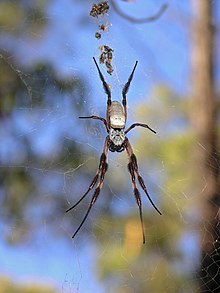Trichonephila edulis
| Trichonephila edulis | |
|---|---|

| |
| Female Trichonephila edulis, Perth, Western Australia.[1] | |
| Scientific classification | |
| Domain: | Eukaryota |
| Kingdom: | Animalia |
| Phylum: | Arthropoda |
| Subphylum: | Chelicerata |
| Class: | Arachnida |
| Order: | Araneae |
| Infraorder: | Araneomorphae |
| Family: | Nephilidae |
| Genus: | Trichonephila |
| Species: | T. edulis
|
| Binomial name | |
| Trichonephila edulis (Labillardière, 1799)[3]
| |

| |
| Synonyms | |
|
Aranea edulis (basionym) | |
Trichonephila edulis is a species of large spider of the family Nephilidae, formerly placed in the genus Nephila. It is referred to by the common name Australian golden orb weaver.[4] It is found in Indonesia from Java eastwards, Papua New Guinea, Australia, northern New Zealand, and New Caledonia.[2]
It has a large body size variability, females can reach a body length of up to 40 millimetres, males about 7 mm. The cephalothorax is black with a white pattern on the back, and a yellow underside; the abdomen is grey to brown.
The web is about 1 metre in diameter and protected on one or both sides by a strong "barrier" web. T. edulis breeds from February to May, and produces an average of 380 eggs.
According to the phylogeny tree of Nephilidae, T. edulis is closely related to its congener Trichonephila plumipes (tiger spider) which is also commonly found in Australia.[5]
Name[edit]
The species was first collected and named by Jacques Labillardiere, in Relation du Voyage à la Recherche de la Pérouse (1799),[6] becoming the second Australian spider to be described by a European naturalist.[7] (The first was Gasteracantha fornicata.)
The species name edulis means "edible" in Latin. Labillardiere wrote: ”Les habitans de la Nouvelle-Calédonie appellent nougui cette espèce d'araignée, que je désigne sous le nom d' aranea edulis (araignée que les Calédoniens mangent).“ („The inhabitants of New Caledonia call this spider nougui. I have described it under the name Aranea edulis, meaning spiders that the New Caledonians eat.“)
As food[edit]
Trichonephilia edulis is an edible spider. Several related spiders are considered a delicacy in New Guinea, "plucked by the legs from their webs and lightly roasted over an open fire".[8]
References[edit]
- ^ Golden orb weavers Ed Nieuwenhuys, Ronald Loggen 1997, 2002, Jurgen Otto 2005. Retrieved 2007-04-07.
- ^ a b Kuntner, M.; Rudolf, E.; Cardoso, P. (2017). "Nephila edulis". IUCN Red List of Threatened Species. 2017: e.T89292344A89292878. doi:10.2305/IUCN.UK.2017-1.RLTS.T89292344A89292878.en. Retrieved 27 July 2021.
- ^ "Taxon details Trichonephila edulis (Labillardiere, 1799)". World Spider Catalog. Natural History Museum Bern. Retrieved 2020-04-29.
- ^ arachne.org.au http://www.arachne.org.au
- ^ Kuntner, Matjaz; Hamilton, Chris A & Cheng, Ren-Chung (2018), "Golden orbweavers ignore biological rules: phylogenomic and comparative analyses unravel a complex evolution of sexual size dimorphism", Systematic Biology, 68 (4): 555–572, doi:10.1093/sysbio/syy082, PMC 6568015, PMID 30517732
- ^ Labillardière, J. 1799. Relation du voyage à la recherche de La Pérouse, fait par ordre de l'Assemblée constituante. Paris Vol. 2 pp. 240-241
- ^ Davies, Valerie Todd; et al. (30 Mar 2006). "Order Araneae: Spiders". Australian Faunal Directory. Government of Australia. Retrieved 2009-03-06.
- ^ Meyer-Rochow, V. B. (1973). "Edible insects in three different ethnic groups of Papua and New Guinea". The American Journal of Clinical Nutrition. 26 (6): 673–677. doi:10.1093/ajcn/26.6.673.
Further reading[edit]
- Uhl, G. & Vollrath, F (2000). Extreme body size variability in the golden silk spider (Nephila edulis) does not extend to genitalia. J. Zool. Lond. 251:7-14 PDF
- Vollrath, Fritz; Madsen, Bo & Shao, Zhengzhong (2001). "The effect of spinning conditions on the mechanics of a spider's dragline silk". Proceedings of the Royal Society of London. Series B: Biological Sciences. 268 (1483): 2339–2346. doi:10.1098/rspb.2001.1590. PMC 1088885.






